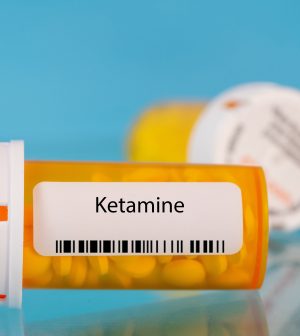- Could Your Grocery Store Meat Be Causing Recurring UTIs?
- Are You Making This Expensive Thermostat Error This Winter?
- Recognizing the Signs of Hypothyroidism
- 10 Strategies to Overcome Insomnia
- Could Artificial Sweeteners Be Aging the Brain Faster?
- Techniques for Soothing Your Nervous System
- Does the Water in Your House Smell Funny? Here’s Why
- Can a Daily Dose of Apple Cider Vinegar Actually Aid Weight Loss?
- 6 Health Beverages That Can Actually Spike Your Blood Sugar
- Treatment Options for Social Anxiety Disorder
FDA Warns of Dangers of Compounded Ketamine for Psychiatric Use

The U.S. Food and Drug Administration is warning consumers about risks of using compounded versions of the drug ketamine, often taken for psychiatric disorders.
Compounded products are not evaluated by the FDA for safety and effectiveness. They’re also not regulated like approved drugs, so they present a greater risk.
“Although compounded drugs can serve an important medical need for certain patients when an FDA-approved drug is not medically appropriate, they also present a risk to patients and should only be used under the care of a health care provider,” the FDA said in a news release.
It offered an example of a concerning case reported about a patient in April.
That person had taken compounded oral ketamine outside of a health care setting for the treatment of post-traumatic stress disorder (PTSD).
The result was slowed breathing and a ketamine blood level that appeared to be twice what a person would typically receive as anesthesia, the FDA said.
Patients are increasingly interested in taking compounded ketamine products, including oral formulations, for mental health disorders including depression, anxiety, PTSD and obsessive-compulsive disorder, according to the FDA.
Known safety concerns associated with the drug are abuse and misuse, psychiatric events, increases in blood pressure, slowed breathing and lower urinary tract and bladder symptoms.
In the FDA-approved version of ketamine, the expected benefit outweighs these risks when used at appropriate doses.
“Despite increased interest in the use of compounded ketamine, we are not aware of evidence to suggest that it is safer, is more effective, or works faster than medications that are FDA-approved for the treatment of certain psychiatric disorders,” the FDA said.
Ketamine hydrochloride is a controlled substance. It is FDA-approved as an intravenous or intramuscular injection solution as part of general anesthesia. It is a mixture of two mirror-image molecules, arketamine and esketamine.
Another approved medication, Spravato, includes only one of the molecules and is approved as a nasal spray for treatment-resistant depression in adults and for depressive symptoms in adults with acute suicidal ideation or behavior. It is given in conjunction with an oral antidepressant.
The FDA previously published an alert early last year about using compounded ketamine nasal spray. The risk alert also included Spravato, which has a Risk Evaluation and Mitigation Strategy (REMS) as part of its FDA approval. (A REMS is a drug safety program that the FDA can require for certain approved medications with serious safety concerns to ensure benefits outweigh the risks.)
The Spravato REMS requires esketamine to be dispensed and administered in medically supervised health care settings that are certified in the REMS. They must agree to monitor patients for at least two hours because of possible sedation and out-of-body sensations (dissociation) as well as the potential for misuse and abuse.
The FDA said it understands that getting compounded products through telemedicine platforms and compounders for at-home use may be attractive to some patients, but it reiterated the risk.
At-home administration of these products is especially risky because of the lack of monitoring for adverse outcomes, the FDA said.
Using compounded products outside a health care setting means there is no monitoring of sleepiness; dissociation or disconnection between a person’s thoughts, feelings and sense of time, space and self; as well as changes in vital signs, including blood pressure and heart rate.
Information about these compounded products, including proper dosing, is lacking, the FDA said.
The agency encouraged compounders, patients and health care providers to report adverse events associated with these products to FDA’s MedWatch Adverse Event Reporting Program.
More information
The U.S. National Institutes of Health has more on ketamine and depression.
SOURCE: U.S. Food and Drug Administration, news release, Oct. 10, 2023
Source: HealthDay
Copyright © 2026 HealthDay. All rights reserved.










